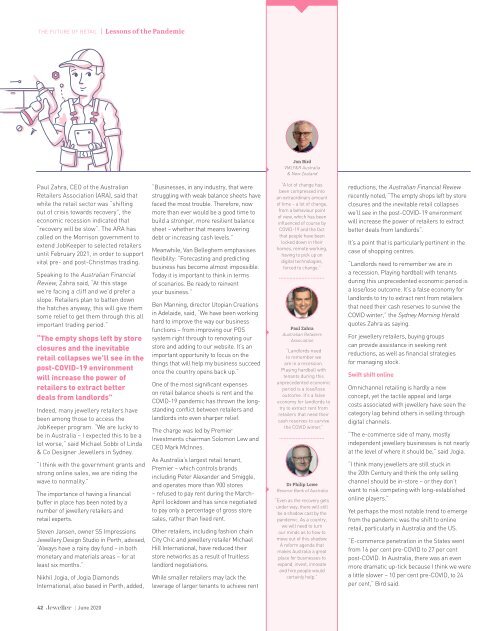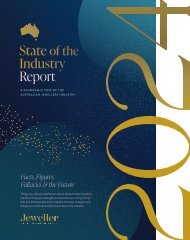Jeweller - June, Edition II 2020
• Shock value: How jewellers can adapt to and even benefit from the impact of COVID-19 • Brave new world: Preparing your business for the 'next normal' of retail • Double or nothing: experts reveal the key strategies to securing multiple-item sales
• Shock value: How jewellers can adapt to and even benefit from the impact of COVID-19
• Brave new world: Preparing your business for the 'next normal' of retail
• Double or nothing: experts reveal the key strategies to securing multiple-item sales
Create successful ePaper yourself
Turn your PDF publications into a flip-book with our unique Google optimized e-Paper software.
THE FUTURE OF RETAIL | Lessons of the Pandemic<br />
Jon Bird<br />
VMLY&R Australia<br />
& New Zealand<br />
Paul Zahra, CEO of the Australian<br />
Retailers Association (ARA), said that<br />
while the retail sector was “shifting<br />
out of crisis towards recovery”, the<br />
economic recession indicated that<br />
“recovery will be slow”. The ARA has<br />
called on the Morrison government to<br />
extend JobKeeper to selected retailers<br />
until February 2021, in order to support<br />
vital pre- and post-Christmas trading.<br />
Speaking to the Australian Financial<br />
Review, Zahra said, “At this stage<br />
we’re facing a cliff and we’d prefer a<br />
slope. Retailers plan to batten down<br />
the hatches anyway, this will give them<br />
some relief to get them through this all<br />
important trading period.”<br />
“The empty shops left by store<br />
closures and the inevitable<br />
retail collapses we’ll see in the<br />
post-COVID-19 environment<br />
will increase the power of<br />
retailers to extract better<br />
deals from landlords”<br />
Indeed, many jewellery retailers have<br />
been among those to access the<br />
JobKeeper program. “We are lucky to<br />
be in Australia – I expected this to be a<br />
lot worse,” said Michael Sobbi of Linda<br />
& Co Designer <strong>Jeweller</strong>s in Sydney.<br />
“I think with the government grants and<br />
strong online sales, we are riding the<br />
wave to normality.”<br />
The importance of having a financial<br />
buffer in place has been noted by a<br />
number of jewellery retailers and<br />
retail experts.<br />
Steven Jansen, owner SS Impressions<br />
<strong>Jeweller</strong>y Design Studio in Perth, advised,<br />
“Always have a rainy day fund – in both<br />
monetary and materials areas – for at<br />
least six months.”<br />
Nikhil Jogia, of Jogia Diamonds<br />
International, also based in Perth, added,<br />
“Businesses, in any industry, that were<br />
struggling with weak balance sheets have<br />
faced the most trouble. Therefore, now<br />
more than ever would be a good time to<br />
build a stronger, more resilient balance<br />
sheet – whether that means lowering<br />
debt or increasing cash levels.”<br />
Meanwhile, Van Belleghem emphasises<br />
flexibility: “Forecasting and predicting<br />
business has become almost impossible.<br />
Today it is important to think in terms<br />
of scenarios. Be ready to reinvent<br />
your business.”<br />
Ben Manning, director Utopian Creations<br />
in Adelaide, said, “We have been working<br />
hard to improve the way our business<br />
functions – from improving our POS<br />
system right through to renovating our<br />
store and adding to our website. It’s an<br />
important opportunity to focus on the<br />
things that will help my business succeed<br />
once the country opens back up.”<br />
One of the most significant expenses<br />
on retail balance sheets is rent and the<br />
COVID-19 pandemic has thrown the longstanding<br />
conflict between retailers and<br />
landlords into even sharper relief.<br />
The charge was led by Premier<br />
Investments chairman Solomon Lew and<br />
CEO Mark McInnes.<br />
As Australia’s largest retail tenant,<br />
Premier – which controls brands<br />
including Peter Alexander and Smiggle,<br />
and operates more than 900 stores<br />
– refused to pay rent during the March-<br />
April lockdown and has since negotiated<br />
to pay only a percentage of gross store<br />
sales, rather than fixed rent.<br />
Other retailers, including fashion chain<br />
City Chic and jewellery retailer Michael<br />
Hill International, have reduced their<br />
store networks as a result of fruitless<br />
landlord negotiations.<br />
While smaller retailers may lack the<br />
leverage of larger tenants to achieve rent<br />
“A lot of change has<br />
been compressed into<br />
an extraordinary amount<br />
of time – a lot of change,<br />
from a behaviour point<br />
of view, which has been<br />
influenced of course by<br />
COVID-19 and the fact<br />
that people have been<br />
locked down in their<br />
homes, remote working,<br />
having to pick up on<br />
digital technologies,<br />
forced to change.”<br />
Paul Zahra<br />
Australian Retailers<br />
Association<br />
“Landlords need<br />
to remember we<br />
are in a recession.<br />
Playing hardball with<br />
tenants during this<br />
unprecedented economic<br />
period is a lose/lose<br />
outcome. It’s a false<br />
economy for landlords to<br />
try to extract rent from<br />
retailers that need their<br />
cash reserves to survive<br />
the COVID winter.”<br />
Dr Philip Lowe<br />
Reserve Bank of Australia<br />
“Even as the recovery gets<br />
under way, there will still<br />
be a shadow cast by the<br />
pandemic. As a country,<br />
we will need to turn<br />
our minds as to how to<br />
move out of this shadow.<br />
A reform agenda that<br />
makes Australia a great<br />
place for businesses to<br />
expand, invest, innovate<br />
and hire people would<br />
certainly help.”<br />
reductions, the Australian Financial Review<br />
recently noted, “The empty shops left by store<br />
closures and the inevitable retail collapses<br />
we’ll see in the post-COVID-19 environment<br />
will increase the power of retailers to extract<br />
better deals from landlords”.<br />
It’s a point that is particularly pertinent in the<br />
case of shopping centres.<br />
“Landlords need to remember we are in<br />
a recession. Playing hardball with tenants<br />
during this unprecedented economic period is<br />
a lose/lose outcome. It’s a false economy for<br />
landlords to try to extract rent from retailers<br />
that need their cash reserves to survive the<br />
COVID winter,” the Sydney Morning Herald<br />
quotes Zahra as saying.<br />
For jewellery retailers, buying groups<br />
can provide assistance in seeking rent<br />
reductions, as well as financial strategies<br />
for managing stock.<br />
Swift shift online<br />
Omnichannel retailing is hardly a new<br />
concept, yet the tactile appeal and large<br />
costs associated with jewellery have seen the<br />
category lag behind others in selling through<br />
digital channels.<br />
“The e-commerce side of many, mostly<br />
independent jewellery businesses is not nearly<br />
at the level of where it should be,” said Jogia.<br />
“I think many jewellers are still stuck in<br />
the 20th Century and think the only selling<br />
channel should be in-store – or they don’t<br />
want to risk competing with long-established<br />
online players.”<br />
Yet perhaps the most notable trend to emerge<br />
from the pandemic was the shift to online<br />
retail, particularly in Australia and the US.<br />
“E-commerce penetration in the States went<br />
from 16 per cent pre-COVID to 27 per cent<br />
post-COVID. In Australia, there was an even<br />
more dramatic up-tick because I think we were<br />
a little slower – 10 per cent pre-COVID, to 24<br />
per cent,” Bird said.<br />
42 | <strong>June</strong> <strong>2020</strong>


















